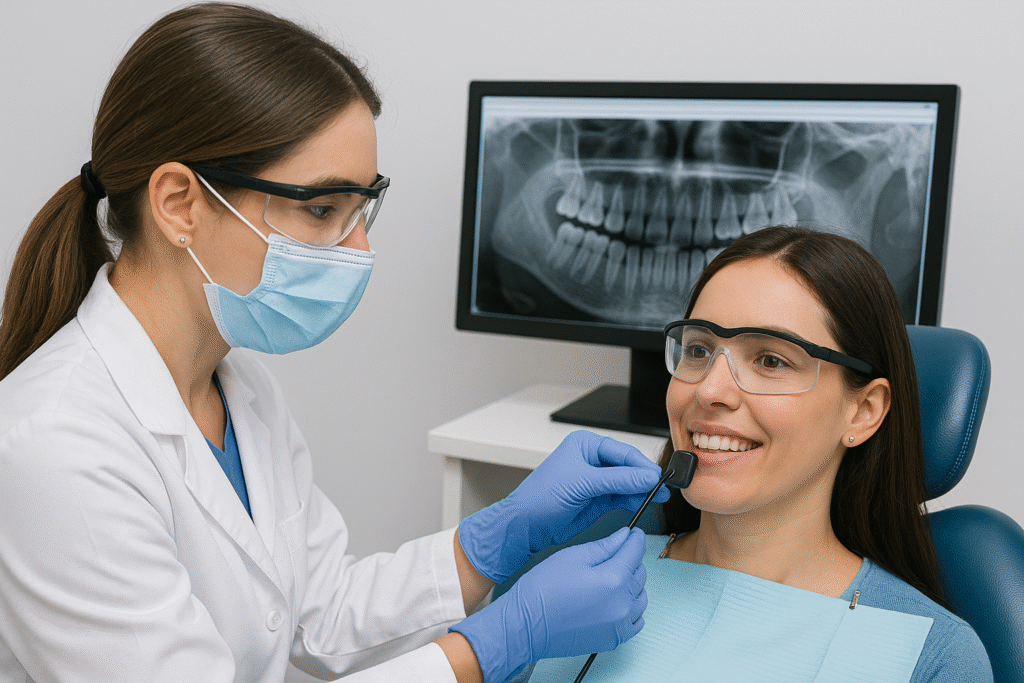Digital Dental X-Rays
Digital Dental X-Rays in Kitchener – Safe, Clear & Modern Imaging

At MI Dental, we rely on Dexis digital X-ray sensors to deliver crystal-clear imaging with exceptional safety. Thanks to modern sensor technology, we reduce radiation exposure far beyond what traditional film could achieve and the dosage in fact is so low that the latest evidence-based guidelines from the ADA now discourage routine use of lead aprons or thyroid collars. Now that is something we never imagined back in the day!
Benefits of Digital X-Rays (vs. Film) + Safety Enhancements
- Significantly Lower Radiation
Digital sensors require far less radiation than traditional film. Combined with modern dose-limiting techniques like collimation and optimized exposure settings, this makes the procedure extremely safe. - Alignment with ADA Best Practices
The ADA’s 2024 expert panel now advises against routine use of lead abdominal aprons and thyroid collars for all patients, because shielding can interfere with image acquisition and provide less protection than modern imaging technology. Instead, radiation protection is better achieved through strategies such as beam restriction (rectangular collimation), proper positioning and judicious imaging. - Sharper, More Diagnostic Images
Dexis titanium sensors give us high resolution and contrast. The clarity allows us to detect small decay, bone loss, and other pathology earlier than film could. - Instant Visualization and Collaborative Planning
No waiting for film development, images appear instantly on our screens, allowing you and your dentist to review and plan together during the same visit. - Eco-Friendly & Efficient
No chemical developers, no film disposal, easier electronic storage, reduced waste. - Seamless Sharing & Tracking
Digital X-rays are stored in your file, making it easy to compare changes over time or quickly share with specialists.
Fun Fact
The radiation from a typical set of bitewing digital X-rays is comparable to or even less than what you would absorb during a short commercial airplane flight (or what you would get from natural background radiation over a day).
At MI Dental, your safety and comfort are top priorities. With Dexis digital sensors and strict adherence to modern radiographic safety guidelines (including those from the ADA), we provide imaging that is fast, precise, and low-risk.
Book your appointment now and experience high-tech, safe diagnostics at MI Dental, Dentist Kitchener.
FAQs
Q: Are digital dental X-rays safe?
Absolutely. The radiation dose is very low, especially with modern techniques (collimation, optimized exposure). The ADA now recommends against routine use of lead aprons and thyroid collars, even for children or pregnant patients, because the technology itself provides sufficient protection when used properly.
Q: Why did the ADA change its recommendation about lead aprons / thyroid collars?
After systematic review, the expert panel concluded that shielding can obstruct the primary beam, increasing the likelihood of getting a poor image and needing retakes. Modern digital systems and beam restriction offer more effective protection than blanket shielding.
Q: Will MI Dental use lead aprons if I want one?
Yes, for the time being we continue to do so as we understand that it can take time for the public in general to feel comfortable with the idea and trust the data. Our priority is your confidence and comfort, though current best practices discourage its routine use.
Q: How often will I need X-rays?
It depends on your individual risk factors (e.g. prior decay, gum disease, symptoms). For many patients, bitewings are taken every 12-24 months, with full-mouth or panoramic views less frequently.
Q: Can these digital X-rays be sent to another dentist or specialist?
Yes, we store and share them securely in digital form, so we can send them quickly at your request.
